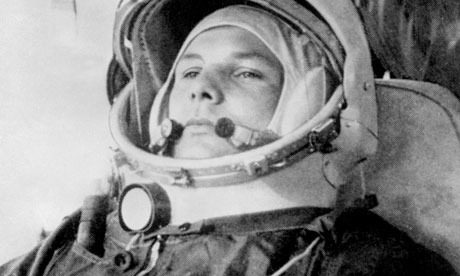 The Google logo declares that today is the day. Exactly 50 years ago on 12th April 1961 he became the first human to journey into outer space when his Vostok spacecraft completed an orbit of the Earth.
The Google logo declares that today is the day. Exactly 50 years ago on 12th April 1961 he became the first human to journey into outer space when his Vostok spacecraft completed an orbit of the Earth.
To help with a bit of an insight, his elder daughter Elena gave her first ever interview about her father to Andrea Rose of the British Council. This is the complete transcript. Here are a couple of surprising details …
Sergei Pavlovich Korolev, “Chief Designer” of the Soviet space programme, chose him, but all six pilots in the first group of cosmonauts were incredibly well prepared. They were extraordinarily physically fit. They were very well trained – even over-trained – because nobody knew what the effects of space would be on the human body. All the first cosmonauts were trained to take decisions very quickly and it was this above all that determined who would be on the first cosmonaut programme. I think this was what finally decided in my father’s favour.
…
I know that he liked Britain very much! The Queen gave him some rather beautiful dolls to bring back for me and Galina. He was in France a number of times, always in connection with the Paris airshows, and that’s what he enjoyed, seeing the new technological aspects of flight.And he liked Cuba a lot. Castro was a good friend. But he would have liked to have been able to travel by himself sometimes, not with the official mission, and to be able to see more and to know more. But it wasn’t possible, because even if he planned something for himself, he was mobbed by people wanting to see him and talk to him. He realised it was part of his job, and he couldn’t refuse.
…
he wrote a letter for my mother saying that it was likely he wouldn’t return, because the flight was extremely dangerous, and that he wanted her not to remain on her own in that case. But he didn’t give her the letter. She found it by chance among his things when he came back. He hadn’t wanted her to find it, and told her that she should throw it away. But of course, she kept it.
…
There is also an interesting story here that comes from newly declassified documents.
Apparently they had a few last minute panics. Shortly before takeoff a fault was discovered with the hatch of the cosmonaut’s Vostok spacecraft. Engineers working at high speed were forced to loosen 32 screws and remove the hatch to mend a faulty sensor. Also the day before the flight, they found that the combined weight of Gagarin, his spacesuit and his seat was 13.6kg (30lb) too heavy. To quickly solve this they stripped away part of the Vostok’s internal apparatus, but in their haste disconnected two gauges, one for pressure and one for temperature. In turn, that caused a short circuit, which they then struggled to fix overnight.
In a letter written to his family two days before the flight – to be opened in case he died – Gagarin, then 27, admitted that an accident could not be ruled out … No kidding, he was watching what was actually happening just prior to the flight, so he must have had to face up to the possibility that this was to be a one way trip.
Other details now also emerge. For example, Gagarin’s craft blasting to 203 miles instead of 143 miles because an engine failed to cut out. Also, the cosmonaut was unable to write in his logbook because his pencil floated off in zero gravity and he couldn’t find it.
There are perhaps many reasons to salute Gagarin, but perhaps the most compelling is to note his courage. He knew all the risks and was aware of many of the failures, yet he did not pause, he still went for it.
Sadly, Gagarin is no longer with us, and was tragically killed on 27 March 1968, during a routine training flight. In April 2011, documents from a 1968 commission setup by the Central Committee of the Communist Party to investigate the accident were declassified. Those documents revealed that the commission’s original conclusion was that either Gagarin or Seryogin had maneuvered sharply, likely to avoid a weather balloon, leading the jet into a “super-critical flight regime and to its stalling in complex meteorological conditions”